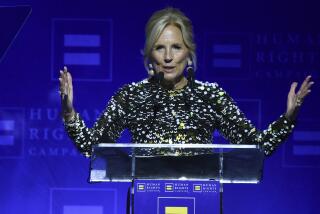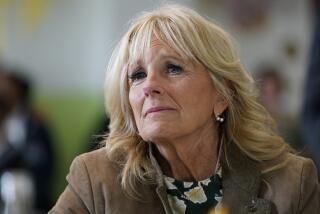First Lady Breaks Ground With Muslims
In a Los Angeles speech hailed by American Muslims as proof they have come of political age, Hillary Rodham Clinton on Thursday became the only first lady to address U.S. Islamic groups outside the White House and promptly urged them to become involved in the nation’s political life.
She also served notice that Muslims in this country can no longer be ignored.
“Islam is the fastest-growing religion in America, a guide and pillar of stability for many of our people,” she said, drawing applause from the audience of 300 at a luncheon sponsored by the Muslim Public Affairs Council and the Muslim Women’s League at the downtown Biltmore Hotel. “That is why an understanding of Islam is long overdue.
“The values that lie at the heart of your experience as Muslims--values of faith, family and community, and responsibility for the less fortunate--are values that are powerful, and they are ones that you share in common with others of us who also seek to honor and live by our values every day.”
There are an estimated 500,000 Muslims in Southern California, and about 5.5 million in the United States, according to Muslim figures.
“I want to challenge all of us to realize that in the next years ahead, much of the world will look to us to see whether it is possible for Christians, Muslims and Jews to live in harmony,” Clinton said.
Her remarks and the attention they brought to a sometimes beleaguered and maligned Muslim community were welcome, coming at a time not only when many U.S. Muslims believe their faith has been unfairly characterized as a “terrorist religion,” but amid new pessimism over prospects for peace in the Middle East in the wake of the apparent election of Benjamin Netanyahu as Israeli prime minister.
“We’re breaking new ground in forging a positive Muslim identity,” said Salam Al-Marayati, director of the Muslim Public Affairs Council, before Clinton’s speech. “The days of exclusion are over. . . . We’re putting a human face on Islam before the American public and before the highest office of the land.”
Among the guests were Roman Catholic, Protestant and Jewish representatives. Monsignor Royale Vadakin, who before his retirement was active in the Los Angeles Roman Catholic archdiocese’s ecumenical efforts, agreed that Muslims were becoming a growing voice in public affairs and called it “a joy” to see a new generation of young Muslim leaders taking an active interest in American life.
The importance U.S. Muslims attached to Clinton’s appearance was apparent in the effusive introduction given her by Maher Hathout, spokesman for the Islamic Center of Southern California and one of the nation’s preeminent Islamic leaders.
“When our country becomes what we dream and when our society becomes warmer and more inclusive . . . it will be written in history in letters of light that the first first lady who took a major step to greet, include and to communicate with Muslims is First Lady Hillary Rodham Clinton,” Hathout declared, drawing loud applause.
In another indication of growing Muslim participation in politics, Clinton was also introduced by Laila Al-Marayati, president of the Muslim Women’s League. Al-Marayati was appointed by the White House to serve as an advisor to the U.S. delegation to the United Nations Conference on the Status of Women held last September in Beijing.
In her remarks, Clinton struck a familiar theme in U.S. politics--the importance of America as a model to the world of multicultural and multiethnic harmony.
Clinton, a member of a United Methodist church, said much more unites Christians, Jews and Muslims than divides them. She warned against those who would fall back on false stereotypes and “sow their evil seeds” of hate.
Drawing on a phrase from the U.S. Constitution, she said Muslims--like other immigrants before them--are contributing to “a more perfect Union.” “We have to make America work,” she said. “We have to improve our own democracy, to stand up against our own voices of hatred and division. It is especially important that we do so by celebrating each other, by respecting each other.”
More to Read
Sign up for Essential California
The most important California stories and recommendations in your inbox every morning.
You may occasionally receive promotional content from the Los Angeles Times.










